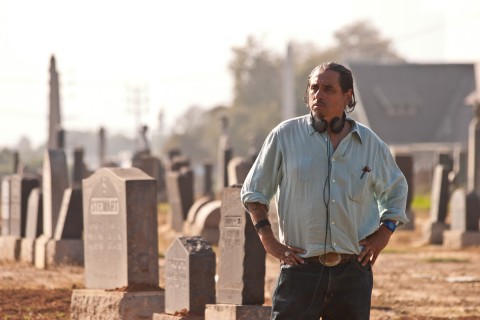COMMENTARY: A Rare Moment and a Long Road for Chilango and Chicano Cinema
By Richard Montoya, CSRC Community Scholar

Several years ago at a large conference in the Midwest, a rowdy crowd moved into a hotel bar after a fiery panel, during which pochismo had been discussed amongst Mexican and Chicano academics, musicologists, and indie filmmakers.
Soon the bar-fueled discussions ended with the fateful cry “Pinches pochos!” Enemy lines had been drawn with cocktail straws, and a series of not-very-threatening punches followed. The Mexicans and Chicanos were going at it again over what Chicanos owe the Mexicans and how lost and aimless Chicanos are in the Labyrinth. Jump cut to several years later, and some of the very people in that bar scene are some of the Mexican filmmakers and producers of the new feature film Cesar Chavez.
César Chávez, it could be said, is our most important pocho. Born and raised on the U.S. side of the line, and even serving in the U.S. Navy, César was no Mexican. That it took a Mexican actor-director, Diego Luna, to bring this film to the silver screen is full of delicious irony and urgency. Luna’s film is a deeply humanizing portrait of a not-so-perfect man carrying the burden of a century of shameful harvests on his back. Luna’s interest in the subject and the very act of making this movie reduce the Chilango versus Chicano discussion regarding pochismo to practically nil. Thank God! There is simply too much work to be done, too many stories to be told, and too many Mexicans dying in the Sonoran Desert—in both countries—to waste time measuring our authenticity. Perhaps one day a nuanced film on the differences between Mexicans and Chicanos will see the light of day, though I would never pay see it.
Having worked in Mexico on Cesar Chavez, I saw firsthand the thoughtfulness and seriousness with which Luna and his collaborators approached the subject. I played the character David Martinez, who finds César in his room the morning he died. It was a purely cathartic moment for me, an out-of-body experience that made me to tremble. When I was at Chávez’s funeral in 1993, I was preoccupied with being a serious writer. I thought it important not to feel, so I observed the proceedings from a self-imposed distance. Years later, on that set in a small stucco home in Hermosillo, Mexico, I crumbled. It was a performance never to be seen: an editor’s victim, it died on the cutting-room floor. Poetic? Perhaps.
At the premiere for Cesar Chavez I thanked Diego nevertheless. As he tried to apologize to me for the editing, I stopped him. I said to him what I tell actors all the time: we are in service of the story, period. This story did not require that scene or my work.
Diego is not without worry. He wonders if we pochos will take to Cesar Chavez. What would failure at the box office mean for the future of our films and the important stories still waiting to be told? We can be a tough crowd, but in the end we will be there in record numbers I hope, showing our love for César and for Diego's heartfelt, well-crafted, and intelligent film.
César also factors in my film Water & Power, which tells the story of the Chicano Movement forty-five years later through the experiences of twin brothers. Water & Power explores what César represented and how his vision has been compromised. It addresses the collision of Hispanic ambition and corruption with our promise to the Movement: that we will not forget those less fortunate than ourselves. One of the brothers in Water & Power is fighting for his legacy project: the César Chávez River Parkway—“One Million Trees for East L.A.” It is all sold down the L.A. River in order to undo the events of one tragic night. The Brothers Garcia fight to save their own necks with little regard to the raza they claim to represent.
Water & Power is a grown-up cautionary tale. Post-Movement? Post-César? Post-pocho? Perhaps, but in the end it is a reminder of the very reasons that compel us to rededicate ourselves to the promise of the Movement and to honor those whose shoulders we stand on.
For now, this post-pocho will thank my Chilango brother for making his beautiful film. It is worthy of our attention and our ticket purchase at the local cineplex. And one day I know Diego will thank me for my unapologetic, fiercely independent, grown-up Chicano film made in twelve nights on the streets and cemented rivers of L.A.
I sincerely hope you will see both films.
Viva César and Pocho Power!
Richard Montoya is the writer and director of Water & Power (a Sundance Lab Project) and a CSRC Community Scholar. Water & Power opens on May 2 at AMC theaters in Los Angeles and San Diego. Cesar Chavez opened nationwide on March 28.
Commentary authored on March 31, 2014
Photo by Rafael Cardenas
